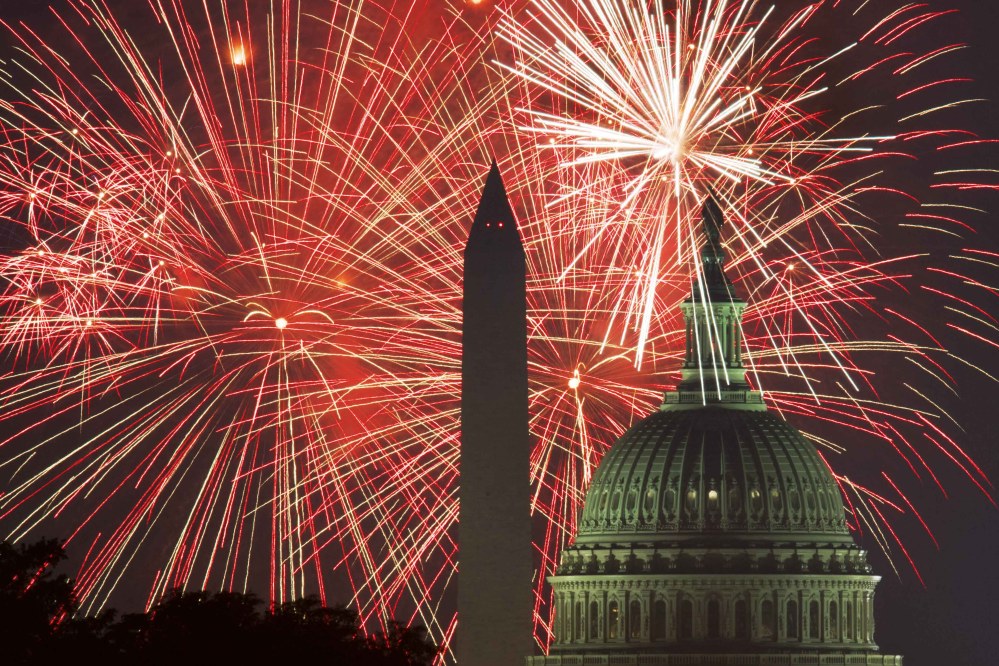Despite the promises of America’s founding documents, on Independence Day 2023, justice, the “general welfare,” “equal protection of the laws” and “life, liberty and the pursuit of happiness” are all at risk. The Supreme Court, conservative governors and gerrymandered state legislatures are racing to shrink fundamental rights and freedoms, enabled and empowered by structural inequities built into the Constitution. The result is that tens of millions of Americans are being deprived of rights that other Americans have.
On Independence Day 2023, justice, the “general welfare,” “equal protection of the laws” and “life, liberty and the pursuit of happiness” are all at risk.
The scale of the disparity is frightening and growing, taking us ever further from America’s founding ideal that “all men are created equal” and its continuing journey toward equal rights for all.
The marquee setback came last year with the high court’s Dobbs decision, which erased a constitutional right that had been in place for nearly half a century. A year later, free to do as they pleased, 14 states fully banned abortion, and a 15th, Georgia, banned it after six weeks of pregnancy (before many women know they are pregnant). At the same time, 20 states where abortion is legal added protections over the past year.
While abortion is a particularly stark example of the democracy divide, U.S. courts and state legislatures are advancing inequality of rights in countless other ways: from last week’s Supreme Court decisions allowing a prospective wedding website designer to refuse services to hypothetical same-sex couples and removing race from the many factors colleges and universities use to assemble diverse student bodies to states’ trying to restrict and ban medical care for transgender people, discussions of gay issues in classrooms and which books can be accessed in libraries.
The solution in many cases is federal legislation, which would require, at minimum, Democrats to reclaim a House majority next year. The party would also have to elect 50 or more senators willing to abolish the filibuster, at least in cases when America’s most sacred promises are threatened.
Here are the inequities that divide the nation most egregiously on Independence Day and are most in need of congressional action:
Voting. Some states make it much harder to vote than others. Why is that allowed? Congress should enact a national law on ballot access and election protection. It already has a vehicle in the 2021 Freedom to Vote Act, based on a bill proposed by Sen. Joe Manchin, D-W.Va., which would make Election Day a holiday and set minimum standards for mail voting, early voting, drop boxes and voter ID and address partisan gerrymandering, voter roll purges, interference with election workers and other issues.

Republicans refused to buy in to the bill last year, and Manchin refused to abandon the Senate filibuster tradition, which requires 60 senators to advance a bill. But other Democrats could make resistance from Manchin and Kyrsten Sinema, I-Ariz., less relevant. Sen. John Fetterman, D-Pa., is a filibuster opponent, and some 2024 Democrats are running on a promise to end it.
Abortion. Congress should codify Roe v. Wade, the 1973 Supreme Court decision that legalized abortion up to fetal viability. For decades, this ruling allowed doctors to deliver the best medical care possible. Now that abortion is a crime in so many states, doctors fear losing their licenses or going to prison, and the choice for women with doomed or dangerous pregnancies is to leave the state for treatment or wait until they are at death’s door, at which point doctors may decide it’s legal to end their pregnancies. Roe also accommodated many religious views about abortion, not just those of conservatives who insist on bans.
Sending the issue to the states guaranteed massive infringements on personal privacy and self-determination.
The First Amendment promotes respect for all religions (or no religion), but by overturning Roe, the Supreme Court freed states to violate that principle. (The court itself just last week violated that principle by blessing a Christian conservative’s desire to deny gay people service on religious grounds.)
Sending the issue to the states guaranteed massive infringements on personal privacy and self-determination, health risks for women and girls and vast gulfs in access. Why should women in Texas risk infertility, disability and death under the state’s bans while women in California (Americans just like them) have safe access to the full range of reproductive care? How is that equal protection?













